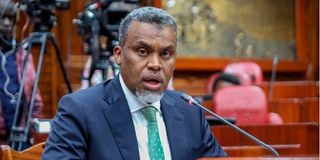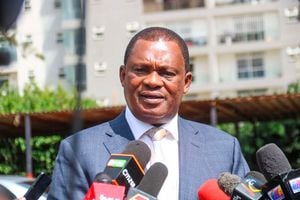
National Intelligence Service (NIS) Director-General Noordin Haji.
They operate in plain sight, and have presence in economic, political and social spheres of life. Still, identifying anyone other than their director-general is a near-impossible task.
The National Intelligence Service (NIS), Kenya’s first line of defence against internal and external threats, is possibly the most enigmatic government agency.
For most State institutions, their purchase of even a pen will be seen and analysed by auditors, legislators and members of the public.
Not the NIS, the only civilian disciplined service.
In her annual audit reports on government agencies, even the agencies with tiny budgets usually have their reviews done on at least five pages.
Not the NIS, whose entire budget is summarised in one page, with the same conclusion reached every year.
Even government institutions with a clean bill of health usually get a couple of pages detailing some numbers and details.
“There were no material issues relating to lawfulness and effectiveness in use of public resources,” is repeated thrice on a single page of the auditor-general’s reports, summarising NIS spending.
As there are no details on the spending and operations, there is not much that can be factually scrutinised by members of the public regarding the spy agency.
Despite commanding a budget two times that of the Judiciary, not much can be written about its spending and operations, as only a select few individuals are privy to documents that would tell that story.
In the 2023/24 financial year, the NIS received Sh45.8 billion for its operations. Parliament received Sh40.4 billion, while the Judiciary got Sh22.9 billion.
NIS finances are checked by the auditor-general, much like any other public body.
But in regards to operations, Roman poet Juvenal’s question – who will guard the guards? – would be a perfect fit and would likely remain unanswered.
Under the NIS Act, a complaints commission is expected to check any excesses by the spy agency. But the commission is yet to be established despite a 2020 High Court order.
The Public Service Commission (PSC) has settled on a name – the NIS Complaints Board – but that is as much progress as has been made in over a decade.
On December 5, 2023, the PSC advertised five positions for board members, but that did not amount to any appointments.
The PSC on December 6, 2024 advertised the positions afresh. The deadline for application lapsed on December 30, 2024.
Whether the fresh bid to constitute the board will flop is, once again, a wait-and-see situation.
The National Assembly and Senate can, however, summon NIS bosses if legislators are investigating an issue that the spy agency can shed light on.
The NIS can also be sued in court, in the event of excesses by its agents. But owing to the nature of its operations, and secrecy in identifying its agents, evidence could be a burden.
Public Service Cabinet Secretary Justin Muturi on Monday shone a spotlight on the NIS, following his claim that the spy agency was behind his son’s abduction on the night of June 22, 2024.
Leslie Muturi was picked up by unknown individuals along Olenguruone Avenue in Nairobi’s Kilimani suburb, and released on the following day.
Mr Muturi in a statement to the Directorate of Criminal Investigations (DCI) on Tuesday claimed that the abductors were NIS agents who only released Leslie after President William Ruto’s intervention.
The CS said that a friend who works with the NIS confirmed that the spy agency was behind the abduction, and that he was present when President Ruto called the spy agency’s Director-General Noordin Haji to secure Leslie’s release.
Top secrecy
Should Mr Muturi’s statement be true, he may have placed his NIS friend’s job and liberty at risk.
Sections 18 and 20 of the NIS binds all its employees to secrecy, and bars them from sharing any information acquired in the line of duty without express permission from the director-general.
Section 18 provides for a maximum sentence of 14 years in prison, while section 20 caps the term at two years.
Under the NIS Act, the agency’s reports to the president, and a select few government officials.
The NIS director-general is the secretary of the National Security Intelligence Council (NSIC), a body whose members also include the Foreign Affairs CS, Treasury CS, the attorney-general, secretary to the Cabinet and the head of the public service.
The NSIC’s job is to advise the NIS on national security matters, expenditure and operations of the spy agency.
The NIS boss also sits on the National Security Advisory Council, which constitutes the President, Deputy President, Interior CS, Defence CS and Foreign Affairs CS.
The NIS posts agents to critical institutions, both public and private, with their primary role being to gather intelligence.
Outside the country, an agent is posted to each embassy as an attaché.
Despite the number of its staff not being made officially public, sources in the agency have intimated that it has approximately 5,000 workers.
The NIS traces its origins to the Special Branch, a unit of the Kenya Police formed in 1952, and whose name was descriptive of its work.
It was the intelligence arm of the Criminal Investigations Department (now the DCI).
Post-independence, the Special Branch became the most feared institution as the administrations of Jomo Kenyatta and Daniel Arap Moi used it to suppress political opposition or criticism of their governments.
Hundreds of Kenyans were abducted, tortured and some even killed by members of the Special Branch.
Some, like former politician Kenneth Matiba, won huge court awards on account of the physical and economic losses they suffered on account of torture by Special Branch agents.
In 1998, Kenya’s Parliament passed the National Security Intelligence Service Act (NSIS). The legislation saw the Special Branch transition into the NSIS.
The NSIS would continue operations for 13 years. Much like its predecessor, the NSIS was accused of excesses, especially during the 2007-2008 post-election violence which stemmed from President Mwai Kibaki’s disputed win at the ballot.
After Kenya enacted the 2010 Constitution, a new law was required to support the intelligence organisation.
This birthed another transition, to the NIS. The NIS Act was primarily drawn by its own officers, and handed over to lawmakers for defending in Parliament and eventually assent by President Mwai Kibaki.
What started as social media chatter on the spy agency’s involvement in a series of abductions that started to peak in June, 2024, got legs to stand on with Mr Muturi’s claims.
The Kenya National Commission on Human Rights (KNCHR) on Monday said it has recorded 85 abduction cases since July, 2024 and that 25 individuals are still missing.
The National Police Service has twice denied any involvement in the abductions.
Director of Public Prosecutions (DPP) Renson Ingonga in December ordered the police to investigate the abductions.
The spotlight has now moved to Mr Haji’s office, which is not particularly known to issue statements or clarifications.
World over, it is rare for intelligence bodies and their chiefs to issue public statements – they are not to be seen or heard, unless by the President.










